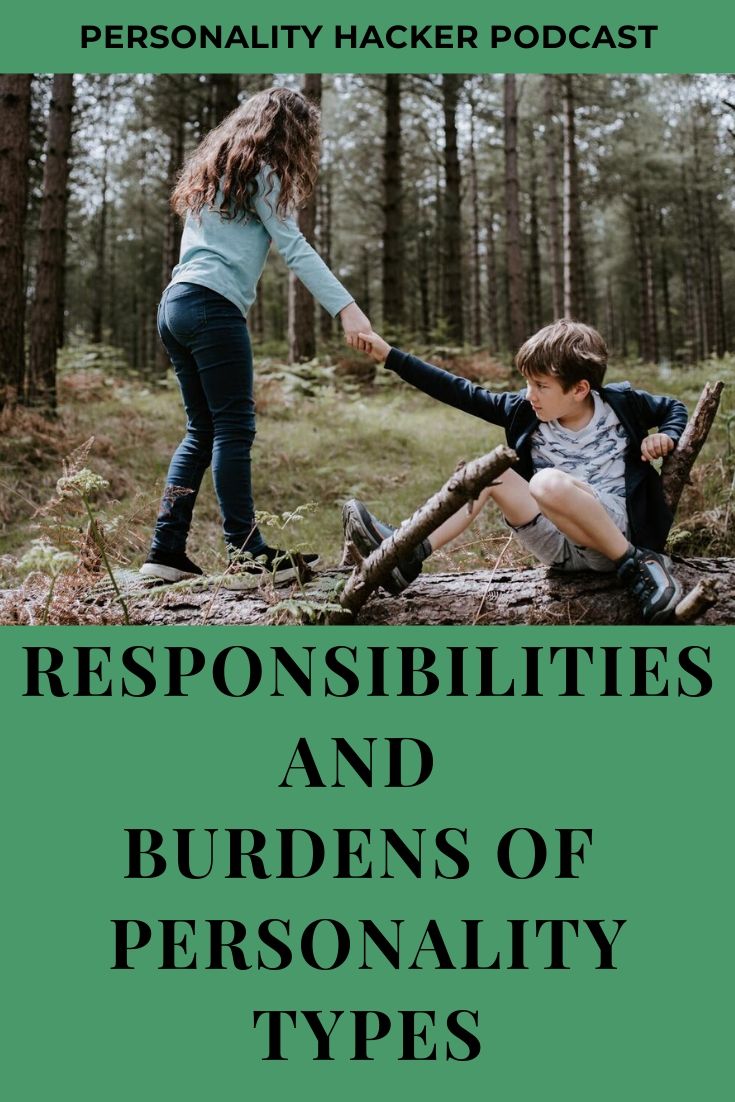Download Episode Here – right click link and select “Save Link As…”
In this episode, Joel and Antonia walk through the tension between personal responsibility and external burden as it relates to our personality.
In this podcast you’ll find:
- When everyday responsibilities become a burden – an example from Joel
-
What’s the difference between something being a responsibility and a burden?
- A biblical take on this theme
- How responsibilities can become burdens
- How does personality type play into the context of responsibility versus burdens?
-
The idea of responsibility and burden as two opposite ends of a continuum
- How do you strike the right balance between the two?
- Looking at burdens and responsibilities through the lens of each Myers-Briggs® dichotomy.
- Revisiting the four dichotomies:
-
Introvert or Extravert
- Introverts – the inner world is the real world
- Extraverts – the outer world is the real world
-
Sensor or iNtuitive
- Sensors – value past precedent or the here and now
- iNtuitives – value imagination and abstraction
-
Thinker or Feeler
- Thinkers – use more impersonal criteria to make decisions
- Feelers – use more personal, feeling criteria to make decisions
-
Judger or Perceiver
- Judgers – prefer outerworld organization and inner world freedom
- Perceivers – prefer to organize their inner world and have freedom in the outerworld
- The responsibilities and burdens of each dichotomy:
-
Introverts and Extraverts:
- The responsibility we all have to manage an open channel to the outerworld and introspect through our innerworld
- Calibrating feedback as an introvert – and a note on the “Introvert movement”
- Getting in touch with your inner truths as an extravert
- How both types can access help with the burden of trauma
-
Sensors and iNtuitives:
- When anxiety (fear of the future) becomes a burden for a sensor
- How to get help managing the burden of uncertainty
- How can over relying on systems to handle real world issues become a burden for iNtuitives?
- The struggle of learning to ask for help as an iNtuitive
-
The three main reasons we experience burdens and their root causes.
- How can we overcome each of these?
-
Thinkers and Feelers:
- Thinkers and their need to deal with emotions
- Feelers and their need for intellectual honesty
- The burdens of trauma for both Thinkers and Feelers
-
Judgers and Perceivers:
- The outerworld is the Judger’s realm – how can this create burdens for both types?
- Why Perceivers need to accommodate the world and Judgers need to be flexible with systems
- How you can leverage “accountability” as a perceiver
- How can you apply this model to your life?
To subscribe to the podcast, please use the links below:
Subscribe with iTunes
Non-iTunes Link
Soundcloud
Stitcher
Google Play
Spotify
Radio Public
PlayerFM
Listen Notes
If you like the podcast and want to help us out in return, please leave an honest rating and review on iTunes by clicking here. It will help the show and its ranking in iTunes immensely! We would be eternally grateful!
Want to learn more?
Discover Your Personal Genius
We want to hear from you. Leave your comments below…



Share:
Podcast - Episode 0320 - How To Explain Personality Type To Newbies
Podcast - Episode 0322 - Keeping Calm When The World Is In Chaos
6 comments
As an infj who has always moved on in life by sorting everything out by myself, I recently realized that a little bit of help (in the form of therapy, accountability friends, a self-help method or any support system) can really remove blockages and boost productivity in much efficient ways than pushing myself in vain…
It took me some time to get there but even if i always try by myself first, it now feels much comfortable buying that service I needed or asking for advice and help, knowing that i would happily give back…
Thank you Joel and Antonia for putting this together so convincingly in this podcast!
I’m an INTP female. Trauma is very interesting in how it may show up for each personality type. I struggled in the grip of Fe, my inferior 3-yr. old, in my younger years and it wasn’t until I incorporated more Ne and Ti development that I was able to get better. Anybody who’s been in their personality grip knows how painful it can be.
My Fe can cause me to become an unhealthy people-pleaser at the expense of my own values. Values for me are what makes ‘logical sense’. Not the same as Fi values. I don’t spend time mulling what is right and wrong per se, I use my Ti to figure out if doing something makes sense for me or not.
With people-pleasing, this means I might have to agree and follow what everyone else does. The most concrete example I can give is me no longer going to church with my family. They just can’t fathom that I questioned religion and certain things don’t make sense for me. It was distraught to my Fe to cause ripples and disharmony within my family, but I had to be honest with my beliefs and align myself accordingly.
Now, my family and I get along for the most part and I’ve been able to nurture my Ne and Ti in ways I’d never imagined. I couldn’t be happier!
I’m a Perceiver, and I’m fascinated by your description of the J/P dichotomy. Judgers like their outer world organized for the sake of inner freedom; Perceivers like the inner world organized for the sake of outer freedom. But while I understand having your thoughts organized, what does it mean to have your feelings organized? (I’m also a Thinker, so maybe that’s why this is not immediately obvious.)
I definitely err on the side of feeling very uncomfortable needing/receiving help.
I had an experience last week that was pretty eye opening for me and fits nicely with this podcast so I thought I’d share it.
I got a pretty awful migraine and started to panic a bit as I could hardly lift my head off the pillow, never mind look after a very energetic 3yr old. I didn’t know where to turn as I thought that no-one would be able to help me/or want to.
I have a group of friends that I see regularly as we all have kids the same age but I felt like they weren’t close friendships that I could lean into for support, but as I was desperate I sent them all a message on a group chat and within minutes they were all offering to come and collect my son and bring me pain killers so that I could go to bed. I was so shocked and pretty overwhelmed by it tbh.
It was a bit of an eye opener that at the age of 33, I was only just experiencing what it was like to feel friendship. I have have had “friends” throughout my life but only in some kind 3rd person experience (that I can remember anyway). It feels a little odd and I’m sure it will take a while to get used to.
I think that “help” I received in my childhood/adolescence actually felt abusive and violating, so any time the thought pops into my head that I may need something from someone or help is offered my fear response is activated and I mentally and physically recoil from relying on anyone and push the thoughts away.
It’s always exciting to figure out an unconscious process so I at least have something to work with.
Sorry to hear you put your back out Joel. I hope you feel fully recovered soon.
If someone has trauma in something that isn’t one of their preferred cognitive functions does that mean they are typed wrong